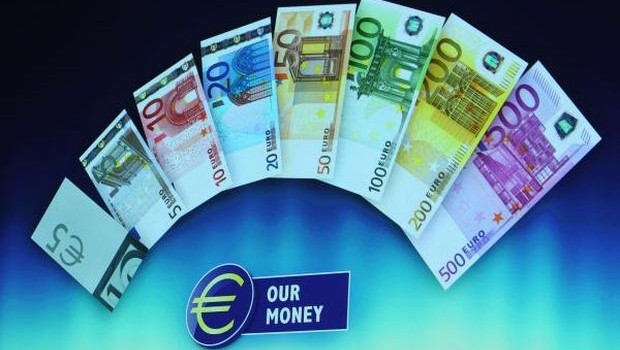
(FILES) – Picture taken on November 8, 2012 shows Euro banknotes projected on a screen during a press conference following the meeting of the European Central Bank (ECB) Governing Council in Frankfurt am Main. The European Commission on June 5, 2013 gave Latvia a green light to join the 17-nation eurozone in January, saying the country had fulfilled the conditions to join the single currency. (AFP PHOTO / DANIEL ROLAND)
European Union officials said Latvia’s willingness to join next year is a vote of confidence for the shared currency. At the moment, the 17-strong group of EU countries that use the euro is struggling with a crisis over too much government debt, a stubborn recession, and 12.2 percent unemployment.
Olli Rehn, the EU’s top economic and monetary official, said Wednesday that Latvia’s membership bid was “further evidence that those who predicted the disintegration of the euro area were wrong.”
The EU Commission, the EU’s executive arm, gave Latvia the thumbs-up Wednesday after an official review. A final decision will be made by eurozone finance ministers July 9 – following further consultation among EU leaders and Parliament.
Once the formal approvals are in, Latvia is expected to replace its national currency, the lat, with the euro on Jan. 1, 2014.
Latvia’s Prime Minister Valdis Dombrovskis tweeted that the decision was “the next step for growth.”
Still, many among the Baltic seacoast country’s 2 million people are skeptical of the need to join in the midst of the eurozone’s debt troubles. Anti-euro parties won more than half the vote in local elections in the capital, Riga, last weekend.
Euro opponent Andris Orols, head of “Latvia for the Lat,” vowed to ask the constitutional court to review the government’s decision. “We are against the euro because we believe that an independent and sovereign country cannot exist without its own money which it controls,” he said.
Latvia committed to join the euro in 2004 when it joined the European Union. Under the EU’s treaty, all EU members must adopt the euro eventually although it can take years to meet the tough requirements. The only exceptions are Britain and Denmark, which were given opt-outs.
Latvia and its Baltic neighbors Lithuania and Estonia tend to be in favor of integration with western Europe, in part due to fear of pressure by Russia. They were forcibly incorporated into the Soviet Union during World War II and only regained their independence in 1991.
To join the euro, Latvia had to show the EU that it could control inflation, deficits and government debt, and keep its currency in a narrow exchange rate range with the euro.
Compared with heavily indebted euro countries such as Greece, Portugal and Italy, its government finances are in good shape. Its budget deficit at the end of 2012 was a modest 1.2 percent of annual economic output, well below the EU’s 3 percent limit. Its debt burden was 41 percent of output, less than the 60 percent requirement and far less than the eurozone average of 91 percent.
Its economy would be the third-smallest, larger only than those of Cyprus and Malta. With annual output of about 22.3 billion euros ($29 billion) it would account for just 0.2 percent of the overall eurozone economy.
Economic benefits of joining the euro include not having the costs and inconvenience of exchanging one currency for another while travelling or doing business across borders. Government and companies in euro states also in theory have wider access to credit from lenders across the eurozone. And the euro is more stable and less prone to inflation than some of its predecessor currencies. Latvia already had some of those advantages by firmly pegging the lat to the euro.
The pluses must be weighed against the loss of a country’s ability to independently raise or lower its interest rates to deal with an economic slowdown or excessive inflation. There is just one benchmark interest rate set for all euro members by the European Central Bank in Frankfurt, Germany, based on the needs of the entire eurozone economy.
Euro members also cannot devalue their currency to boost exports, as a way of adjusting to an economic downturn or crisis.
Latvia has won praise from the EU and international finance officials for pushing through required reforms – mainly cuts to wages and government spending – to make its economy more competitive.
That put Latvians through several years of austerity. It also came soon after a profound recession in 2008-2010, when the economy shrank about 25 percent as a credit-fuelled real estate boom collapsed. The economy has since returned to strong growth, expanding 5.6 percent in 2012.
Despite the Commission’s preliminary approval, European officials expressed lingering concerns about the country’s banking system due to its high percentage of deposits from non-residents, mainly Russians. Non-resident depositors are regarded as more likely to flee in case of trouble than domestic savers. This could undermine the stability of the banks.
In a separate assessment, the European Central Bank said that Latvia would need to exercise continued vigilance to make sure inflation stayed under control and that its banks were strong enough. It called non-resident deposits “an important risk to financial stability.”
Non-resident deposits became a concern after Cyprus, which also had large foreign deposits from Russia, needed a bailout. Rehn stressed that Latvia’s banking system is much smaller, less than 1.5 times economic output compared with more than 8 times in Cyprus, and so less likely to be a source of trouble. “That obviously makes a huge difference,” he said.
Cyprus’ banks failed largely because of heavy losses on Greek government bonds, not because depositors fled.
